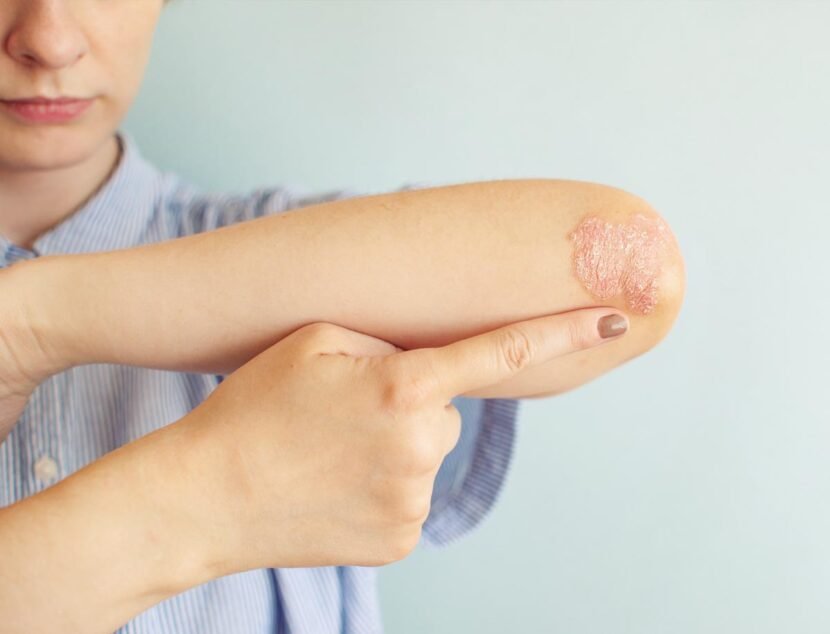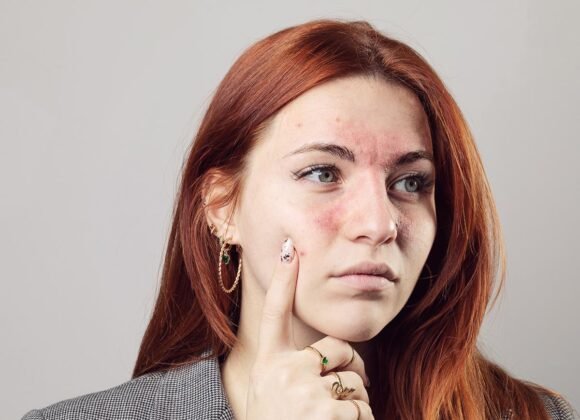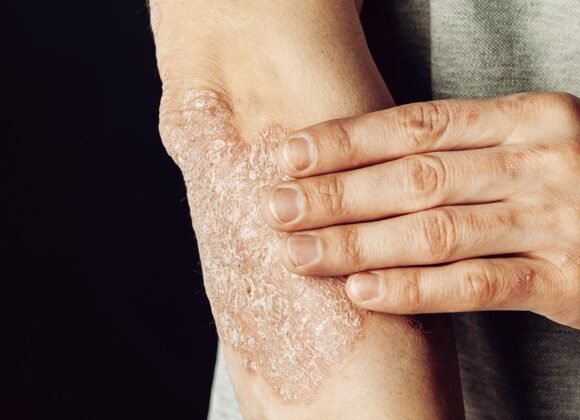Eczema, also known as atopic dermatitis, is a chronic skin condition characterized by inflammation, itching, and redness. It affects individuals of all ages but is most prevalent in children. The condition can manifest on any part of the body, with common areas including the face, hands, feet, and the creases of elbows and knees.
While the exact etiology of eczema remains unclear, it is believed to result from a combination of genetic predisposition and environmental factors. A family history of eczema or other allergic conditions such as asthma or hay fever is often observed in affected individuals. Contrary to common misconceptions, eczema is neither contagious nor caused by poor hygiene.
The condition stems from the skin’s compromised ability to retain moisture and protect itself against irritants and allergens. People with eczema typically have dry, easily irritated skin that is prone to flare-ups. Various triggers can exacerbate the condition, including stress, certain foods, environmental allergens, and irritants like soaps and detergents.
Although there is no definitive cure for eczema, numerous treatments are available to manage symptoms and prevent flare-ups. It is crucial for individuals with eczema to collaborate with healthcare professionals to develop tailored treatment plans that address their specific needs and triggers.
Key Takeaways
- Eczema is a chronic skin condition characterized by red, itchy, and inflamed skin.
- Common symptoms of eczema include dry, sensitive skin, intense itching, and red, inflamed skin.
- Eczema can be caused by a combination of genetic and environmental factors, including allergens and irritants.
- Diagnosing eczema involves a physical examination, medical history, and possibly allergy testing.
- Treatment for eczema may include moisturizing, avoiding triggers, using topical corticosteroids, and managing stress.
Common Symptoms of Eczema
Physical Symptoms of Eczema
The itching associated with eczema can be intense and can interfere with daily activities and sleep. In children, eczema often appears as red, scaly patches on the cheeks and scalp, while in adults it is more commonly found on the hands, feet, and in the folds of the elbows and knees.
Emotional Impact of Eczema
In addition to the physical symptoms, eczema can also have a significant impact on a person’s emotional well-being. The constant itching and discomfort can be distressing and can lead to feelings of embarrassment and self-consciousness. People with eczema may also experience anxiety and depression as a result of their condition.
Coping with Eczema
It is important for people with eczema to seek support from healthcare professionals, as well as friends and family, to help them cope with the emotional impact of the condition.
Understanding the Causes of Eczema
The exact cause of eczema is not fully understood, but it is believed to be a combination of genetic and environmental factors. People with eczema often have a family history of the condition or other allergic conditions such as asthma or hay fever. Eczema is thought to be related to a dysfunction in the skin barrier that allows moisture to escape and irritants to enter, leading to inflammation and itching.
This dysfunction may be due to variations in certain genes that affect the skin’s ability to protect itself. In addition to genetic factors, environmental triggers can also play a role in causing eczema flare-ups. These triggers can include allergens such as pollen, pet dander, and dust mites, as well as irritants such as soaps, detergents, and certain fabrics.
Stress can also exacerbate eczema symptoms by triggering the body’s inflammatory response. Understanding the specific triggers that affect an individual’s eczema can help them manage their condition more effectively.
Diagnosing Eczema
Diagnosing eczema typically involves a physical examination of the skin and a review of the patient’s medical history. The healthcare professional will look for the characteristic signs of eczema, such as dry, itchy skin and red or inflamed patches. They may also ask about any family history of eczema or other allergic conditions.
In some cases, additional tests such as skin patch testing or blood tests may be performed to identify specific allergens that could be triggering the eczema. It is important for people with suspected eczema to seek a diagnosis from a healthcare professional in order to receive appropriate treatment. While there is no cure for eczema, there are treatments available to help manage the symptoms and prevent flare-ups.
Working closely with a healthcare professional can help individuals develop a personalized treatment plan that addresses their specific needs and triggers.
How to Treat Eczema
There are several treatment options available for managing eczema symptoms. These may include moisturizers to keep the skin hydrated, topical corticosteroids to reduce inflammation and itching, and antihistamines to help control itching and improve sleep. In more severe cases, systemic medications such as oral corticosteroids or immunosuppressants may be prescribed.
It is important for individuals with eczema to work closely with a healthcare professional to determine the most appropriate treatment plan for their specific needs. In addition to medical treatments, there are also several self-care strategies that can help manage eczema symptoms. These may include avoiding known triggers such as certain foods or environmental allergens, using gentle soaps and detergents, and wearing soft, breathable fabrics.
It is also important to keep the skin well moisturized and to avoid scratching, as this can further irritate the skin and lead to infection.
Prevention and Management of Eczema
Avoiding Triggers
While there is no cure for eczema, avoiding known triggers can help reduce the frequency and severity of flare-ups. Certain foods, environmental allergens, and irritants can trigger eczema symptoms, so identifying and avoiding these triggers is crucial.
Skincare Routine
Using gentle soaps and detergents, wearing soft, breathable fabrics, and keeping the skin well moisturized can also help prevent irritation and itching. A consistent skincare routine can help manage eczema symptoms and reduce the risk of flare-ups.
Managing Stress
Managing stress is also an important part of preventing eczema flare-ups. Stress can trigger the body’s inflammatory response, leading to increased itching and discomfort. Engaging in stress-reducing activities such as yoga, meditation, or exercise can help manage stress levels and reduce the impact on eczema symptoms.
Living with Eczema: Coping Strategies and Support
Living with eczema can be challenging, both physically and emotionally. The constant itching and discomfort can be distressing and can interfere with daily activities and sleep. It is important for people with eczema to seek support from healthcare professionals, as well as friends and family, to help them cope with the emotional impact of the condition.
In addition to seeking support from others, there are several coping strategies that can help individuals manage their eczema symptoms. These may include practicing good skincare habits such as keeping the skin well moisturized and avoiding scratching, engaging in stress-reducing activities such as yoga or meditation, and seeking out support groups or online communities for people with eczema. In conclusion, eczema is a chronic skin condition that causes inflammation, itching, and discomfort.
While there is no cure for eczema, there are treatments available to help manage symptoms and prevent flare-ups. By working closely with healthcare professionals and implementing self-care strategies, individuals with eczema can effectively manage their condition and improve their quality of life.
FAQs
What is eczema?
Eczema, also known as atopic dermatitis, is a chronic skin condition that causes inflammation, itching, and redness. It can appear as dry, scaly patches on the skin and is often accompanied by blisters or oozing lesions.
What are the common symptoms of eczema?
Common symptoms of eczema include itching, redness, dryness, and inflammation of the skin. It can also cause the skin to become thickened, cracked, or scaly. In some cases, eczema may lead to oozing or crusting of the affected areas.
Where does eczema commonly appear on the body?
Eczema can appear on any part of the body, but it is most commonly found on the face, hands, feet, and the insides of the elbows and knees. It can also affect the neck, chest, and back.
What triggers eczema flare-ups?
Eczema flare-ups can be triggered by a variety of factors, including dry skin, irritants (such as soaps or detergents), allergens (such as pet dander or pollen), stress, and changes in temperature or humidity. Certain foods and environmental factors can also trigger eczema symptoms.
Is eczema contagious?
Eczema is not contagious. It is a chronic, non-infectious condition that is believed to be caused by a combination of genetic and environmental factors.
How is eczema diagnosed and treated?
Eczema is typically diagnosed based on a physical examination and a review of the patient’s medical history. Treatment may include moisturizing the skin, avoiding triggers, using topical corticosteroids or other medications to reduce inflammation, and managing itching and discomfort. In some cases, phototherapy or systemic medications may be recommended. It is important for individuals with eczema to work closely with a healthcare professional to develop a personalized treatment plan.




